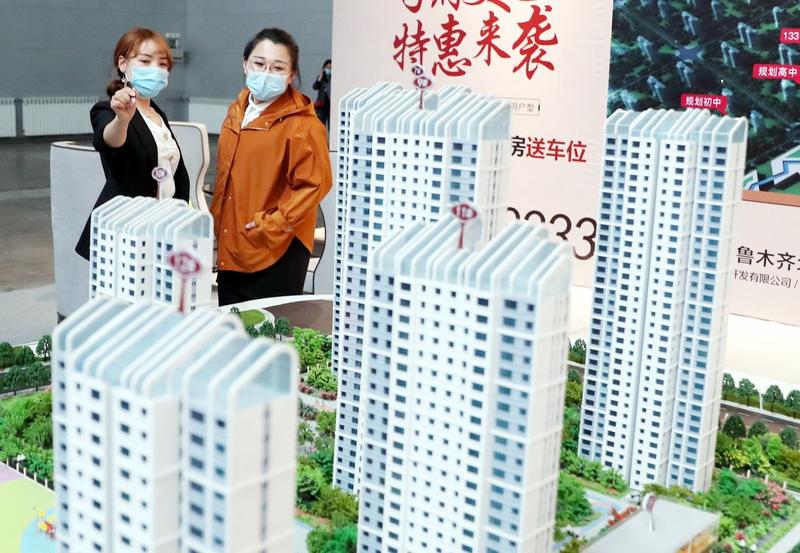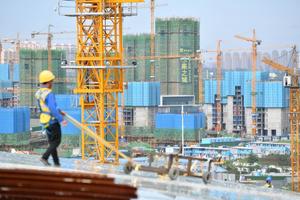 A saleswoman (left) shows a model of a newly developed residential area to a potential homebuyer at a real estate fair in Urumqi, the capital city of Xinjiang Uygur autonomous region, on April 24. (PHOTO BY ZHANG XIUKE / FOR CHINA DAILY)
A saleswoman (left) shows a model of a newly developed residential area to a potential homebuyer at a real estate fair in Urumqi, the capital city of Xinjiang Uygur autonomous region, on April 24. (PHOTO BY ZHANG XIUKE / FOR CHINA DAILY)
Although the COVID-19 pandemic sprang an unpleasant, unprecedented and unexpected surprise on China's residential property market last year, a combination of factors will likely ensure the situation will improve beyond expectations this year, industry experts said.
Nationwide, investment in residential properties rose 7.6 percent year-on-year to reach 10.44 trillion yuan (US$1.61 trillion) in 2020, data from the National Bureau of Statistics (NBS) showed.
Housing market analysts projected that the nation's new home transaction volume reached 15 trillion yuan last year, up about 8 percent from the previous year.
The nation's 70 major cities tracked by the NBS reported a stable month-on-month growth of 0.1 percent in new home prices in December.
In 42 of the 70 cities, new home prices increased in December, despite a largely low year, given the focus on containing COVID-19.
Hui Jianqiang, head of research with Beijing Zhongfang-Yanxie Technology Service Ltd, said, "As the unprecedented 2020 has come to an end, the nation's real estate market is growing positive in terms of both volume and value of transactions, a proof of the resilient Chinese economy."
A period of stability, solidity and positive growth awaits the home market. The foremost reason for that is the sense of optimism created by the decisions taken during the Central Economic Work Conference, experts said.
The annual conference, which was held from Dec 16 to Dec 18 in Beijing, placed emphasis on the principle that the quality of living is key to the well-being of people.
The conference noted, "We must uphold the principle that 'housing is for living in, not for speculation', and implement policies in accordance with each city's respective conditions, so that our property market will head in the direction of stable and healthy development."
ALSO READ: Rental housing key to solving problems related to urbanization
That would translate to an assurance that unhealthy or irrational price swings will be preempted, making affordable housing in sought-after cities a realizable dream, particularly for young homebuyers.
Trends that are stoking glad tidings in that direction are adoption of digital technologies, online sales, and value-added services like better management of residential estates, redesign of interiors for the work/study-from-home era, and introduction of green and sustainable building practices.
The Central Economic Work Conference noted, "We must uphold the principle that 'housing is for living in, not for speculation', and implement policies in accordance with each city's respective conditions, so that our property market will head in the direction of stable and healthy development"
These developments are buoying the spirits of the developers, encouraging them to commit to not only higher investments but enhanced quality of their constructions and related services.
Yuan Xiaochao, director of research with Colliers International East China, said, "Maintaining home prices in a reasonable growth range will ensure a city remains attractive to homebuyers, so that every resident can enjoy the benefits of the even and stable development of the property sector."
If property prices soar, however, there would be a trickle-down effect on every aspect of living, undermining the prospects for long-term healthy development of a city, Yuan said.
Shaun Brodie, senior director and head of business development services with Cushman & Wakefield East China, said, "Looking into the future, we are likely to see several changes in the residential property market in China as a direct or indirect result of COVID-19."
According to him, COVID-19 has accelerated the real estate industry's adoption of digital technologies, which will create new opportunities.
Property companies were forced to try out online sales. For their part, potential homebuyers got used to virtual reality tours and livestreaming to get a feel of homes on sale.
 A worker engages in construction work of a new building in Chengdu, Sichuan province, on Aug 13. (PHOTO / CHINA NEWS SERVICE)
A worker engages in construction work of a new building in Chengdu, Sichuan province, on Aug 13. (PHOTO / CHINA NEWS SERVICE)
As many as 60 percent of users of Beike app, an online unit of Ke Holdings, received property-related information online via websites or apps, according to a survey by the Beike Research Institute.
Changes are also visible in the redesign of residential apartments' interiors as the experience of working/studying from home and contactless deliveries has spawned demand for customization, Brodie said.
Real estate developers are investing big time in digitalization. According to Zhang Yan, CEO of China Real Estate Information Corp, 14 of the nation's top 50 property developers by revenue allocated several million yuan each for digitalization, 16 developers spent more than 10 million yuan each, and a few lavished more than 100 million yuan each last year.
More than half of the top 50 property firms have also created specialized digital operations teams. Each such digital team has more than 50 members, said Zhang.
"Real estate is one of the most important industries of China. It is currently undergoing a transition, and digitalization would play a supportive role in this process," said Feng Jun, president of the China Real Estate Association.
According to Feng, the industry should step up efforts to increase digitalization, especially in the construction of property projects and their subsequent maintenance, operations and renovation.
"In addition, digitalization can promptly match homebuyers with their preferred apartments to raise home trading efficiency," Feng said.
The Beike survey report said the central government's efforts to maintain growth in the volume of real estate transactions between 7 percent and 8 percent would be one of the best drivers of the sector's digitalization.
Promoting digitalization in home transactions calls for the participation of related government bodies, the acceleration of digital infrastructure development, and the cultivation of an adequate number of professionals with the necessary talent and digital skills.
There is also increasing awareness about the need for better property management, according to James Macdonald, head and senior director of Savills China Research.
Agreed Ding Zuyu, CEO of E-House (China) Enterprise Holdings Ltd. "There were 42 listed property management companies as at the end of December 2020, and with their broader services to offer, it is expected their combined management space would increase by nearly 20 billion square meters in the coming decade."
During the peak period of the COVID-19 contagion last year, more than 200,000 property management firms offered various services to their patrons. Such services included household management, maintenance, fresh food and grocery delivery, convenience stores, elderly care, medical care and healthcare.
China's 14th Five-Year Plan (2021-25) stresses the importance of improving people's well-being. And for property management companies, that would mean sharpening the focus on improved services, said Li Changjiang, executive director and president of Country Garden Services Holdings Co Ltd.
"We will consistently improve our services to satisfy people's growing requirements for better property management," Li said.
Developers are expected to seek out professional property managers to enhance the attractiveness of a residential project, thereby potentially increasing both sales and income from property management fees.
That would be welcome because the pandemic has had an adverse impact on financing. To cope, property developers have been striving to diversify into property management, healthcare and commercial leasing. They have also been seeking opportunities across the real estate industrial chain, said Xie Chen, head of research with CBRE China.
That has become necessary because real estate sales have been polarized between the extremes of top-tier cities and lower-tier cities. The residential market remained strong in leading cities throughout 2020, but demand seems to be running out of steam elsewhere.
This trend could eventually lead to some changes. "While first-tier cities cannot afford an ever-growing population, the ongoing urbanization would enable smaller cities to attract a considerable portion of the population to own a property there and settle down," said Hui of Beijing Zhongfang-Yanxie Tech.
Meanwhile, given the principle that housing is for living in, more people, particularly the younger generation, would probably rent first before buying properties, Hui said.
In the context of China's new dual-circulation development paradigm, opportunities exist for further development of the real estate industry, experts said.
"A stronger, more resilient economy is, of course, beneficial to all segments of the property market," said Macdonald
Agreed Brodie. "Moving forward, the dual-circulation strategy will underline a balanced approach where both the domestic and external economie complement each other in the process of driving overall economic growth in China."
READ MORE: Xi: Dual-circulation ensures good start for 14th FYP
That would bring across-the-board opportunities for all businesses related to real estate, he said.


